Does Metformin Cause Hair Loss?
A guide to tell you how to deal with hair issues induced by this prescription drug.
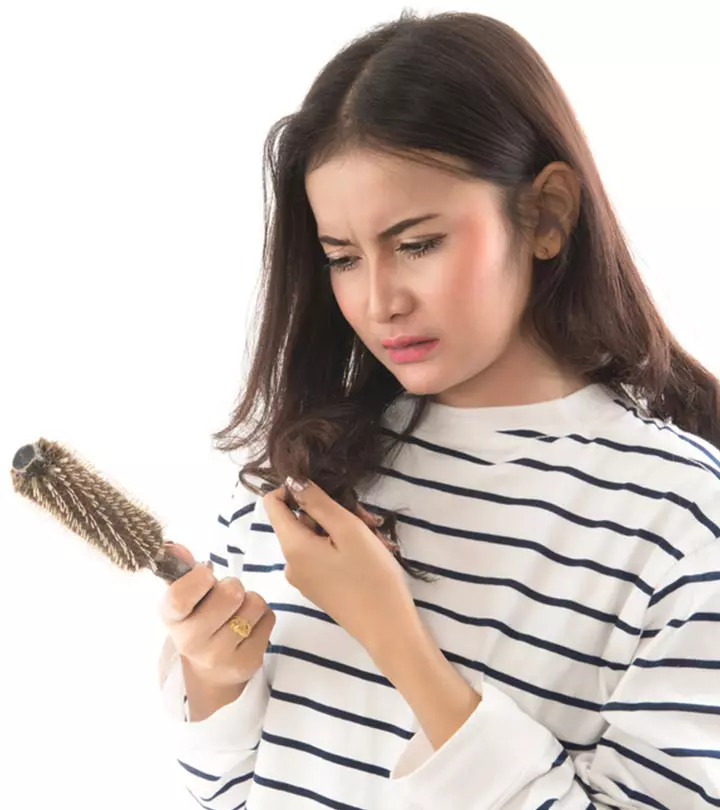
Image: Shutterstock
Health conditions like diabetes and ovarian disorders are hard enough to deal with. Wondering whether Metformin causes hair loss can have a toll on your mental health as well.
Metformin is a prescription drug for treating type 2 diabetes and polycystic ovary syndrome (PCOSi Polycystic ovarian syndrome, where ovaries become enlarged with cysts and lead to irregular menstrual cycles. ). There have been some reports of people experiencing hair loss after taking Metformin for a prolonged period. Keep reading to learn about the link between Metformin and hair fall.
In This Article
What Is Metformin?
Metformin or metformin hydrochloride is prescribed to manage type 2 diabetes in high-risk people (1), (2). The drug is on the World Health Organization’s (WHO) List of Essential Medicines (3).
Metformin helps control the sugar levels in your blood and increases the body’s response to insulin. It is available as a liquid, a tablet, and an extended-release (long-acting) tablet and should be taken orally (2).
Although metformin is well tolerated, it may cause a few side effects, like (2):
- Bloating
- Constipation
- Stomach pain
- Gas
- Heartburn
- Headache
- Muscle pain
In rare cases, metformin may also cause chest pain. A few people reported hair loss as another possible side effect of metformin usage. Is that true? Let’s take a closer look.
 Did You Know?
Did You Know?Key Takeaways
- Metformin is a prescription medication that may help manage type 2 diabetes by controlling blood sugar levels.
- It is well tolerated but may sometimes cause side effects, such as constipation, bloating, and heartburn.
- While there is no direct scientific evidence that the medication causes hair loss, some evidence suggests that it may occur as it reduces vitamin B12 levels in the body.
- You may treat this hair loss by consulting a doctor, taking supplements, and following a healthy diet.
Does Metformin Cause Hair Loss?

There is no scientific evidence to establish a direct link between metformin and hair loss. However, a few isolated reports of people experiencing hair loss while taking the drug have emerged in the past few years.
In one report, an individual with type 2 diabetes who took metformin and sitagliptin experienced excessive shedding of the scalp and eyebrow hair (4). In this case, hair loss may have been drug-induced, but there is no conclusive evidence to prove the same.
Another study found that metformin’s long-term use may reduce the levels of vitamin B12 and folate (5). The lack of these two vital nutrients may trigger hair loss (6).
If you are taking metformin and notice hair loss, it might be due to the lack of vitamin B12. Let’s take a closer look at this in the next section.
Metformin And Vitamin B12 Deficiency
Metformin can lead to reduced vitamin B12 absorption in the gastrointestinal tract. An average of 6% to 30% of patients who used metformin can develop vitamin B12 deficiency. The American Diabetes Association treatment guidelines recommend regular monitoring of vitamin B12 levels in people with diabetes who take metformin (7).
Vitamin B12 is necessary for DNA synthesis, neurological function, and red blood cell formation. A deficiency of this water-soluble vitamin can lead to numerous serious health issues, including hematologic and neurologic symptoms (8).
Vitamin B12 deficiency is also linked to hair loss (6). Low levels of the vitamin can lead to weaker hair follicles. It can also cause anemiai A condition where blood doesn’t have enough red blood cells, leading to a hemoglobin deficiency and reduction in blood oxygen. , which is associated with hair thinning and hair loss. Premature graying is another possible symptom of vitamin B12 deficiency. You can add B12-rich foods, like fish, lean meats, eggs, and dairy to your diet to maintain healthy levels of this vitamin. If you are vegan or vegetarian, fortified cereals or plant-based milks can help. Your doctor might also suggest taking a supplement under certain circumstances to stay on track.
It is unclear whether metformin leads to hair loss or not, but diabetes patients using the drug may experience excessive hair fall for many reasons. We examine the several underlying reasons below.
Diabetes And Hair Loss

Studies have found a correlation between type 2 diabetes and the risk of hair loss (9). Diabetes can slow down hair growth and cause excessive hair loss. It is not rare for those with type 2 diabetes to lose eyebrow hair and body hair. The rate of hair regrowth is also slower.
People with diabetes are also more likely to develop alopecia areata universalis – a condition in which the immune system attacks the hair follicles, causing complete loss of body hair (10). The stress of living with a chronic medical condition like diabetes may also trigger hair fall and thinning hair.
Currently, there is no concrete proof to suggest that metformin can cause hair loss. Thus, it is also helpful to look at some other related causes of hair loss to identify the real problem.
Maddie Nielsen, a YouTube vlogger, shares her experience of being diagnosed with type 1 diabetes and her struggle with hair fall. She mentions, “The other things I noticed in conjunction with this hair thinning were that I had a lot of itchy scalp, and this is something I primarily noticed; actually, immediately after I started injecting myself with synthetic insulin, I had a lot of breakouts of itchy skin (i).”
Metformin does have many unpleasant side effects, but excessive hair fall and balding are not among these (2). If you are experiencing hair fall while taking the drug, you may want to consider several other related factors (11):
- Genetics
Family history can have a great impact on a person’s hair health. If you have a family history of alopecia and pattern baldness, you are more likely to develop it.
- Medications And Supplements

Prescription drugs and steroids for conditions like cancer, depression, heart problems, blood pressure issues, and arthritisi A common disorder that causes inflammation and pain of one or more joints, which gradually tend to worsen with age. may cause hair loss. If you are taking any other drug along with metformin, consult your doctor about drug interactions.
- Hormonal Changes
Pregnancy, childbirth, menopausei The end of the monthly menstrual cycle that occurs in women in their 40s or 50s due to the decline of female reproductive hormones. , and thyroid problems involve hormonal changes that may cause severe hair fall. Discontinuing birth control pills may also cause hormonal imbalance and hair fall.
- Medical Conditions
If you have other medical conditions, your hair loss can be caused by several reasons other than metformin. Conditions like thyroid disease, autoimmune diseases that attack hair follicles like alopecia areata, and fungal infections like ringworm can lead to temporary or permanent hair loss. Trichotillomania, a hair-pulling disorder, and diseases like lichen planus and some types of lupusi An inflammatory disease that occurs when the immune system attacks its own tissues and organs, causing joint pain, fatigue, and rashes. also cause excessive hair fall and balding.
- Stressful Events
Going through an extremely stressful event like the death of a loved one or a divorce can cause a general thinning of hair and excessive hair fall. People who have been through physical trauma may also experience hair loss. Stress-induced hair loss is usually temporary.
- Hairstyles And Hair Treatments
Individuals who love experimenting with their hairstyles may experience a type of hair fall called traction alopecia. Sometimes, permanent hair treatments may also cause hair to fall out. Often, hair loss due to these reasons is temporary. However, if the follicles are damaged, hair loss may be permanent.
Before assuming that taking metformin is causing your hair to fall, consider the above factors. But if you are certain that your hair loss is linked to metformin, here is what you can do to manage the situation.
How To Treat Metformin Hair Loss?
- Get A Complete Blood Test
Iron deficiency and hormonal imbalances can cause hair fall (12). To determine the exact reason or deficiencies, do a blood test and consult your doctor for advice.
- Follow A Healthy Diet And Take Supplements

A well-balanced nutritious diet is important for maintaining good hair health. Insufficient nutrition can cause a range of health issues, including hair fall and thinning hair (12). Consume lots of fresh fruits, vegetables, legumes, seeds, and nuts in your diet. Consult your doctor and ask them if you need any multivitamin supplements to meet your unique nutritional requirements.
- Consult A Trichologist
You may also consult a trichologist, an expert in hair health, for guidance and solution.
- Change Your Hairstyle
Losing hair can be distressing. Avoid styling your hair in a way that might pull the roots. Consult a good hairstylist and style your hair in a way that makes it look fuller.
 Quick Tip
Quick TipIf you are considering taking metformin for health reasons, here are a few things you need to keep in mind.
Things To Know Before Using Metformin
Apart from the previously discussed side effects, here are a few things to remember before you start taking metformin:
- Risk Of Lactic Acidosis
Metformin may rarely cause a serious health condition called lactic acidosis (2). It is a medical condition characterized by lactate buildup in the body, leading to low bloodstream pH. Lactic acidosis is often the result of an underlying chronic medical condition, medication, or poisoning. Consumption of alcohol increases your risk of developing lactic acidosis.
- Allergies

Before taking metformin, do inform your doctor if you have any allergies. A few medications and drug interactions may cause allergic reactions.
- Serious Medical Issues
If you are above the age of 65 or have medical conditions like kidney disease, heart disease, cancer, or liver disease, talk to your doctor about your health history. Also, tell them about your smoking and drinking habits, if any.
- Other Prescription Drugs And Supplements
If you take any prescription drugs to manage other health conditions, discuss this with your doctor before taking metformin. Some drugs can cause unpleasant reactions if taken together (2). Also, tell your doctor about any nutritional supplements like multivitamin pills or herbal remedies you may be taking.
Metformin is a prescription medication for treating type-2 diabetes. While there is no empirical evidence to show that metformin causes hair loss, a few reports observe that many people experience excessive hair loss after taking metformin. Type-2 diabetes may cause various complications inside your body and trigger hair loss. Therefore, inform your doctor if you are taking metformin to manage type-2 diabetes and notice hair fall. Also, consume a healthy and nutritious diet, take supplements, and follow a proper hair care routine to minimize hair loss.
Frequently Asked Questions
How long can you stay on metformin?
When you are prescribed metformin, there are chances that you will be on it long-term, unless it causes health complications or you manage to make certain healthy lifestyle changes that require you to stop taking it.
Can you take biotin with metformin?
Yes. It is safe to take biotin with metformin as they are not found to be harmfully reactive with each other. Moreover, biotin has shown results in improving blood sugar control in people with type 2 diabetes. It may also help in hair regrowth if you are experiencing hair thinning or hair loss.
What medications cause hair loss in females?
There are many medications that cause hair loss in females. Certain antibiotics and antifungal drugs, contraceptive pills, breast cancer (and other cancers) treatment drugs, cholesterol treatment drugs, acne medications containing retinoidsi A class of compounds derived from vitamin A that are used in cosmetics to help reduce wrinkles and other signs of aging. , antidepressants, and anti-clotting drugs have been reported to cause hair loss in females.
Illustration: Metformin And Hair Loss: Is There A Connection?

Image: Dall·E/StyleCraze Design Team
References
Articles on StyleCraze are backed by verified information from peer-reviewed and academic research papers, reputed organizations, research institutions, and medical associations to ensure accuracy and relevance. Read our editorial policy to learn more.
- Metformin: Current knowledge
https://www.ncbi.nlm.nih.gov/pmc/articles/PMC4214027/ - Metformin
https://medlineplus.gov/druginfo/meds/a696005.html - World Health Organization Model List of Essential Medicines
https://iris.who.int/bitstream/handle/10665/325771/WHO-MVP-EMP-IAU-2019.06-eng.pdf - Loss of Eyebrows and Eyelashes During Concomitant Treatment with Sitagliptin and Metformin
https://pubmed.ncbi.nlm.nih.gov/27758711/ - Adverse effect of metformin therapy on serum vitamin B12 and folate: short-term treatment causes disadvantages?
https://pubmed.ncbi.nlm.nih.gov/23751310/ - The Role of Vitamins and Minerals in Hair Loss: A Review
https://www.ncbi.nlm.nih.gov/pmc/articles/PMC6380979/ - Association between metformin dose and vitamin B12 deficiency in patients with type 2 diabetes
https://www.ncbi.nlm.nih.gov/pmc/articles/PMC6867725/ - Vitamin B12 Deficiency
https://www.ncbi.nlm.nih.gov/books/NBK441923/ - Association of type 2 diabetes with central-scalp hair loss in a large cohort study of African American women
https://www.ncbi.nlm.nih.gov/pmc/articles/PMC6831789/ - Simultaneous development of insulin dependent diabetes mellitus and alopecia areata universalis
https://pubmed.ncbi.nlm.nih.gov/2012115/ - Alopecia areata
https://www.ncbi.nlm.nih.gov/pmc/articles/PMC5573125/ - Diet and hair loss: effects of nutrient deficiency and supplement use
https://www.ncbi.nlm.nih.gov/pmc/articles/PMC5315033/
Read full bio of Dr. Shruti Chavan
Read full bio of Ramona Sinha
Read full bio of Anjali Sayee
Read full bio of Monomita Chakraborty







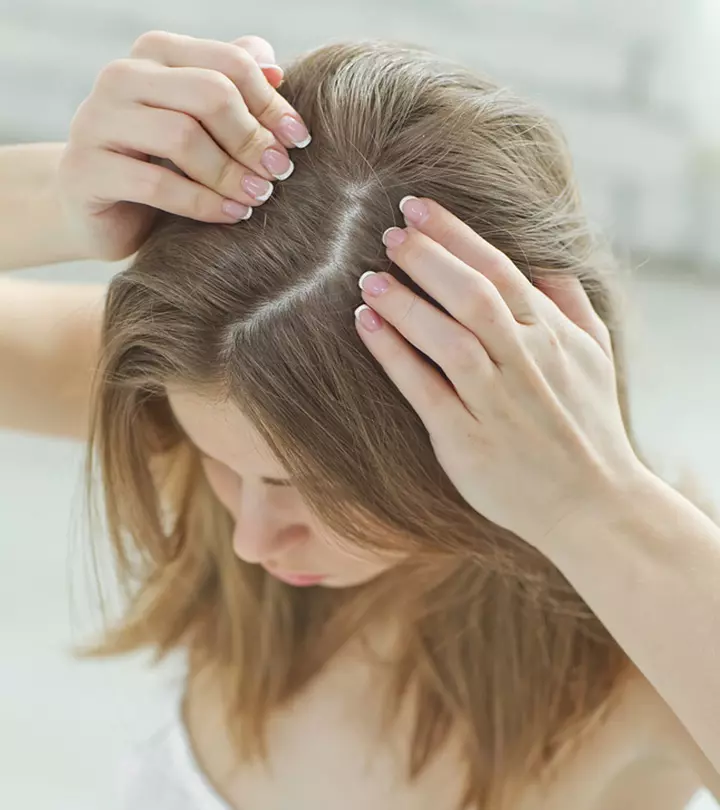

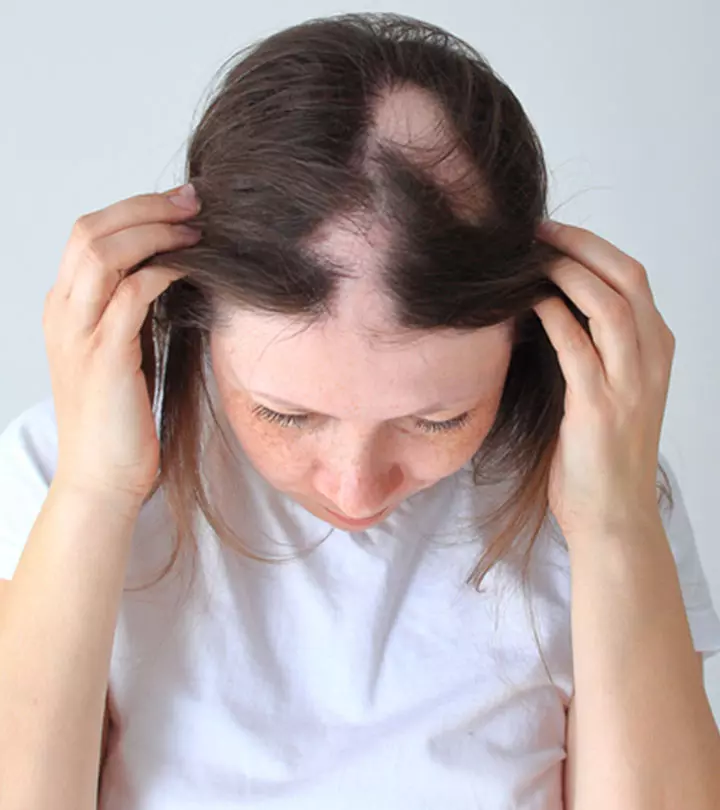


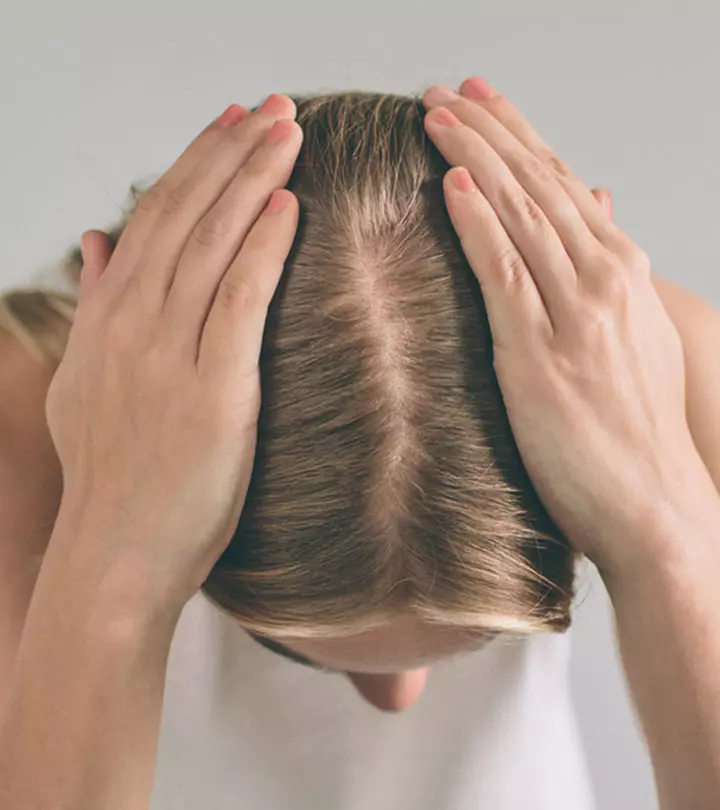

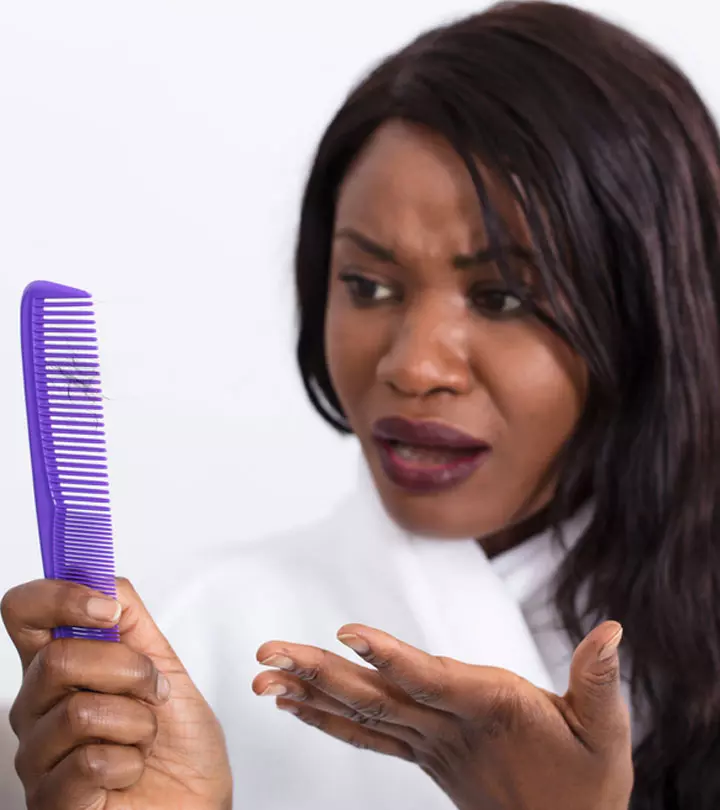









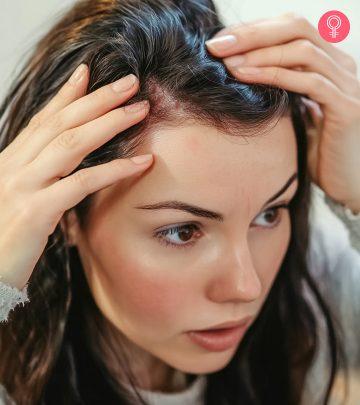

Community Experiences
Join the conversation and become a part of our empowering community! Share your stories, experiences, and insights to connect with other beauty, lifestyle, and health enthusiasts.